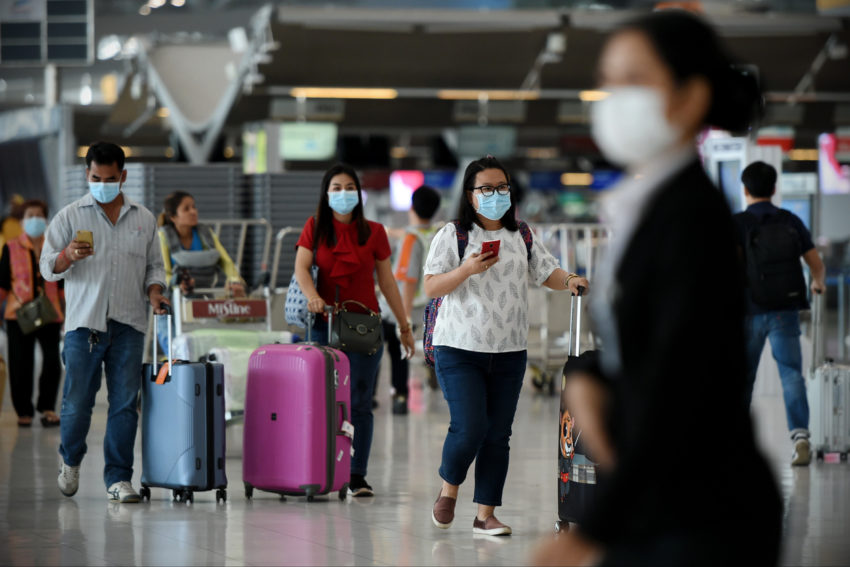
Share On Social!
While the elderly are highly susceptible to becoming infected with the coronavirus, as well as its effects, young adults aren’t off the hook, either.
Those under the age of 44 make up a significant portion of coronavirus hospitalizations in the US, according to a new CDC report on July 10, 2020. Considering the high rate of infection among minority groups, young people of color are also facing significant threats.
“I think everyone should be paying attention to this, and it’s not just going to be the elderly,” Stephen S. Morse, a professor of epidemiology at Columbia University’s Mailman School of Public Health told New York Times. “There will be people age 20 and up. They do have to be careful, even if they think that they’re young and healthy.”
New Data Sheds Light
The CDC’s latest data shows that in the last week alone, this demographic is experiencing high hospitalizations. 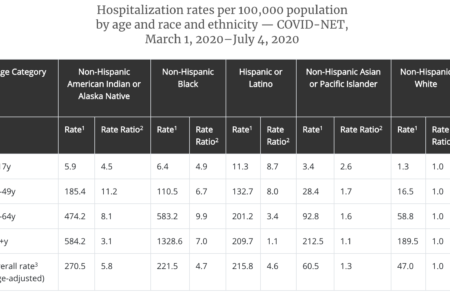
- 37.7% were between ages 18 and 49
- 28.1% were between ages 50 and 64
- 34.1% were between ages 65 and up
Worse, adults under the age of 65 made up roughly half of the patients in intensive care units, according to the CDC.
“The risk is multifold because young people are more often susceptible to the same conditions that increase the risk of exposure, including working on the frontlines,” Dr. Mary T Bassett, director of the Center for Health and Human Rights at Harvard University and New York City’s former health commissioner, told The Guardian.
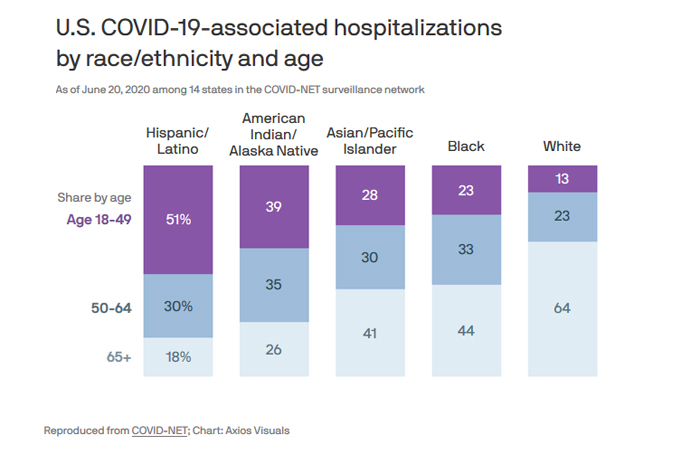
Also, over half (51%) of coronavirus hospitalizations among Latinos/Hispanics are among those ages 18-49, according to data from COVID-NET on June 30, 2020.
Public health officials are warning those under the age of 65—especially young adults who are less likely to follow CDC guidelines—to practice an abundance of caution despite early reports that suggested coronavirus mainly impacted the elderly.
These numbers go to show that young people are not doing that, according to Dr. Deborah Birx, the President’s US Global Aids Coordinator and US Special Representative for Global Health Diplomacy.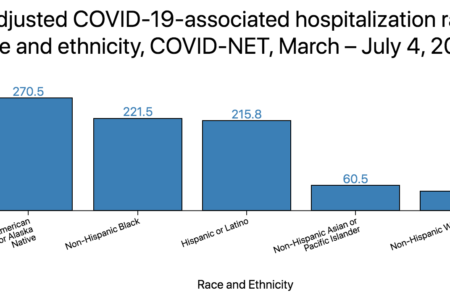
“There are concerning reports coming out of France and Italy about some young people getting seriously ill and very seriously ill in the ICUs,” Birx said at a recent White House press briefing. “We think part of this may be that people heeded the early data coming out of China and coming out of South Korea of the elderly or those with preexisting medical conditions were a particular risk.
“It may have been that the millennial generation … there may be disproportional number of infections among that group and so even if it’s a rare occurrence it may be seen more frequently in that group.”
Why it Matters to Latinos
Previously CDC data suggested that Latinos and Blacks together comprise 55% of coronavirus cases — nearly double their US population makeup.
Latinos made up 33% of COVID-19 cases, and Blacks made up 22%, according to a CDC analysis of 1.3 million lab-confirmed coronavirus cases from January 22 to May 30.
US Latinos already bear an extraordinary burden of COVID-19 cases and deaths and health and social inequities.
Recent deaths among young adults also reveal the significant role that underlying health conditions such as heart disease, obesity, cancer, and diabetes play in the amplified suffering of Latino communities during the COVID-19 pandemic.
The COVID-19 outbreak is worsening Latino health, social, and income inequities and raising fears of disparities in disease rates, exposure, testing, and prevention, which has caused disproportionately higher rates of cases and death, job loss, and other inequitable impacts.
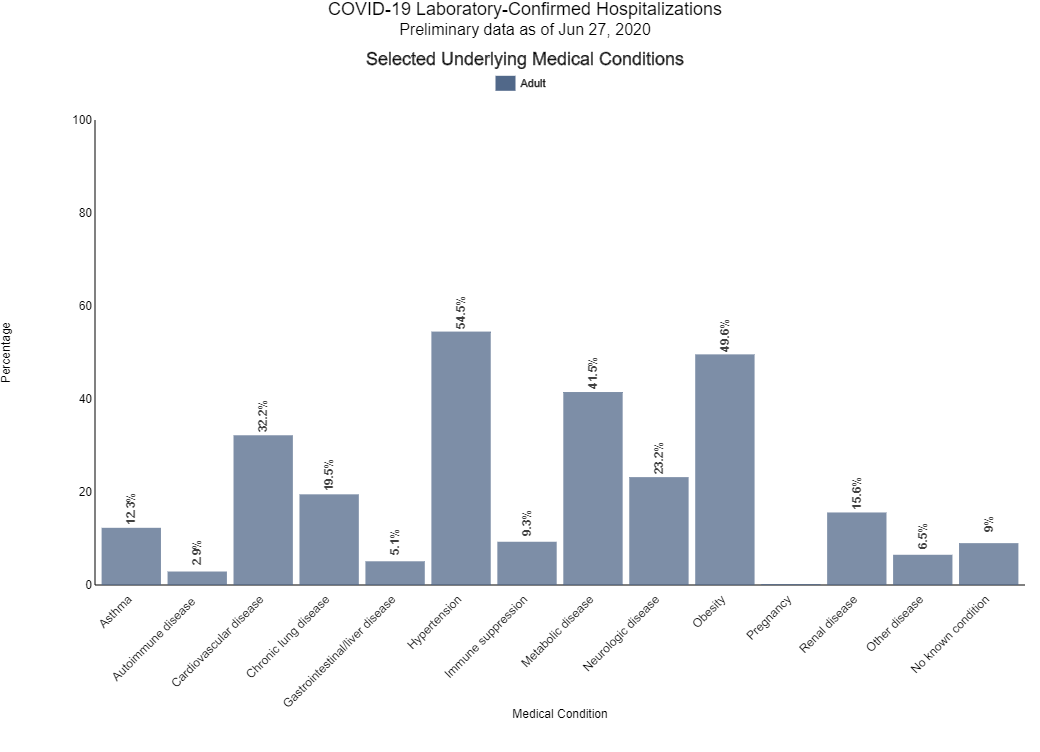
Many researchers say obesity is one of the most important predictors of severe coronavirus illness, especially among young patients, and young Latino in the United States have one of the highest obesity rates.
Latinos who have overweight and obesity are more likely to suffer from high blood pressure, high levels of blood fats, diabetes and LDL cholesterol, heart disease, certain cancers, and other health problems, and these underlying conditions then increase the risk for severe cases of coronavirus.
Compared to non-Hispanic whites, Latinos and blacks experience higher rates of chronic conditions at earlier ages and higher death rates. These underlying medical conditions may put people at increased risk for severe illness.
Pregnant Latinas Are Also at High Risk for COVID-19 Hospitalization
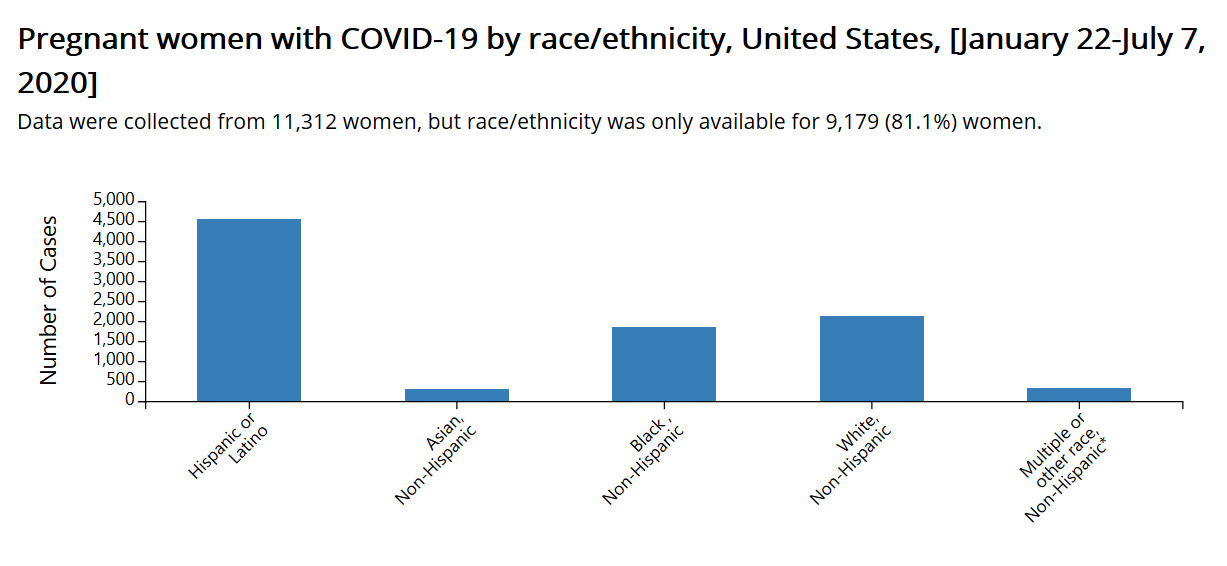
Update 7/14/20: A growing number of Latinas comprise a disproportionate share of coronavirus cases in the U.S., according to the latest pregnancy data released by the CDC.
Out of the 11,312 pregnant women who tested for coronavirus, Latinas accounted for more than 4,500 cases, with 3,252 hospitalized and 31 deaths.
“Pregnant women access health care more regularly, they need to come in for their ultrasounds or prenatal appointments, they need to come in regularly and routinely to check on mom and check on baby,” Dr. Atul Nakhasi, a primary care physician and policy adviser at the Department of Health Services in Los Angeles, toldo ABC News.
Latino inequities, such as concentrated poverty, chronic health conditions, and habits like smoking, are all connected to an increased risk of becoming infected with COVID-19.Moreover, COVID-19 and opioid addiction can also impact and worsen each other, mainly for young Latinos.
Thereby, it’s misleading for several reasons to say that young people have nothing to worry about when it comes to the coronavirus.
Raise Awareness of Inequities During the Pandemic
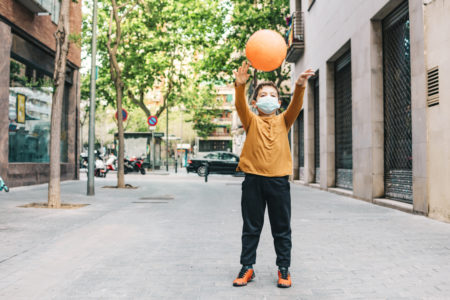
This Data only goes to show what advocates and public health officials have known for years: That people of color are suffering from major disparities and need greater protection.
Check out these 19 solutions to immediately ease the coronavirus pandemic and its impact on Latinos and people of color, as well as make long-term strides to address underlying inequities that are aggravated during this time.
Also, get a “Health Equity Report Card” for your area! Select your county name and get a customized Health Equity Report Card by Salud America! at UT Health San Antonio and email your Health Equity Report Card to decision-makers, share it on social media, and use it to make a case for community change to boost health equity for the long-term.
Learn more about the coronavirus pandemic and Latino health:
Explore More:
Overcoming Harmful BiasesBy The Numbers
3
Big Excuses
people use to justify discriminatory behavior



